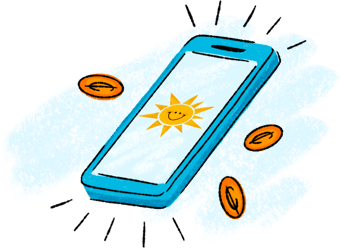Have you ever found yourself wondering where your hard-earned money disappeared at the end of the month? Or perhaps you're constantly battling the urge to splurge on things you don't really need? You're not alone. Many of us struggle with bad spending habits that can hinder our path to financial success. In this friendly and professional guide, we'll help you identify common money-wasting habits and share effective strategies to break free from them. It's time to take control of your finances and work toward a brighter future.
Related Article: 5 Ways to Protect Your Credit Score
Part 1: Identifying Common Money-Wasting Habits
Before we can conquer our financial challenges, we need to understand them. Identifying common money-wasting habits is the first step toward financial self-improvement. Here are some habits to watch out for:
Impulse Buying
We've all been there – you walk into a store to buy one item and leave with a shopping cart full of things you never planned to purchase. Impulse buying is a money-wasting habit that can quickly drain your bank account.
Solution: To curb impulse buying, create a shopping list and stick to it. If you see something you want but didn't plan to buy, give yourself a cooling-off period of 24 hours. If you still want it after that, consider adding it to your next budget.
Eating Out Frequently
Dining at restaurants and ordering takeout can add up significantly over time. While there's nothing wrong with the occasional treat, frequent restaurant meals can be a big drain on your finances.
Solution: Set a limit on dining out each month and allocate a portion of your budget to it. Cooking at home can also help you save money and improve your culinary skills.
Neglecting Budgeting
Ignoring your budget or failing to create one is a surefire way to waste money. Without a financial plan, it's easy to overspend and lose track of your financial goals.
Solution: Establish a budget and stick to it. Tools like budgeting apps can make this process easier by helping you track your income and expenses. Regularly review and adjust your budget to reflect your financial goals.
Subscription Overload
The convenience of subscription services can lead to subscription overload, where you're paying for services you no longer use or need. Streaming platforms, gym memberships, and magazine subscriptions are common culprits.
Solution: Review your subscriptions and cancel those you no longer use or enjoy. This will free up money for more important financial goals.
Credit Card Debt
Accumulating credit card debt through overspending and high-interest rates is a major money-wasting habit. It not only depletes your savings but also increases your overall debt load.
Solution: Pay off your credit card balances in full each month to avoid interest charges. If you have existing credit card debt, focus on paying it down as quickly as possible and avoid adding to it.
Part 2: Strategies for Breaking Bad Spending Habits
Now that you've recognized some common money-wasting habits, it's time to explore strategies for breaking free from them. With dedication and a few changes to your financial routine, you can pave the way to a more financially secure future.
1. Create a Realistic Budget
Begin by creating a comprehensive budget that covers all your expenses and income. Ensure that your budget is realistic and tailored to your financial goals. It should also account for some flexibility to accommodate unexpected expenses.
- Allocate a specific amount for each category, including bills, groceries, entertainment, and savings.
- Prioritize your financial goals, such as saving for emergencies, retirement, or a big purchase.
- Stick to your budget by tracking your expenses and adjusting as needed.
2. Build an Emergency Fund
One of the best ways to break bad spending habits is to have a safety net in place. An emergency fund can prevent you from dipping into savings or accumulating debt when unexpected expenses arise.
- Aim to save at least three to six months' worth of living expenses.
- Open a separate savings account for your emergency fund and automate contributions to it.
- Only use the fund for genuine emergencies, like medical bills or car repairs.
3. Limit Credit Card Use
Credit cards can be useful tools, but they can also lead to overspending and high-interest debt if not managed wisely.
- Use cash or debit cards for everyday purchases to stay within your budget.
- Keep one credit card for emergencies and major expenses, but avoid using it for daily expenses.
- Pay off your credit card balance in full every month to avoid interest charges.
4. Practice Delayed Gratification
Impulse buying is a hard habit to break, but practicing delayed gratification can help.
- When you want to buy something on a whim, wait at least 24 hours before making the purchase.
- Use this time to consider if the item is a true necessity or something you can live without.
- This delay can help you make more thoughtful spending decisions.
5. Cut Down on Non-Essential Expenses
Reducing non-essential expenses is a great way to free up money for your financial goals.
- Review your subscriptions and cancel those you no longer use or need.
- Consider brewing your own coffee instead of buying it daily to save money.
- Set a monthly entertainment budget to avoid overspending on leisure activities.
6. Seek Support and Accountability
Breaking bad spending habits can be challenging, but it's easier with the support of friends, family, or a financial advisor.
- Share your financial goals with a trusted friend or family member for accountability.
- Consider joining a financial support group or seeking advice from a financial advisor.
- Remember, seeking help is a sign of strength in your quest for financial improvement.
7. Reward Yourself in Moderation
It's important to celebrate your financial victories, but do so in moderation.
- Set milestones for your financial goals and reward yourself when you achieve them.
- This can help motivate you to stay on track and prevent feelings of deprivation.
The Light at the End of the Tunnel
Breaking bad spending habits is a crucial step on the path to financial freedom. By identifying common money-wasting habits and implementing effective strategies to overcome them, you can take control of your finances and work toward a brighter future. Remember that financial success is a journey that requires patience and dedication. With the right mindset and commitment to change, you can achieve your financial goals and enjoy the peace of mind that comes with financial security. So, go ahead, take those first steps today, and watch your financial future become a reality.
What do fish use as currency to purchase anything?
Sand Dollars! Sign up to receive important information on banking, financial tips, and jokes like this directly to your inbox










